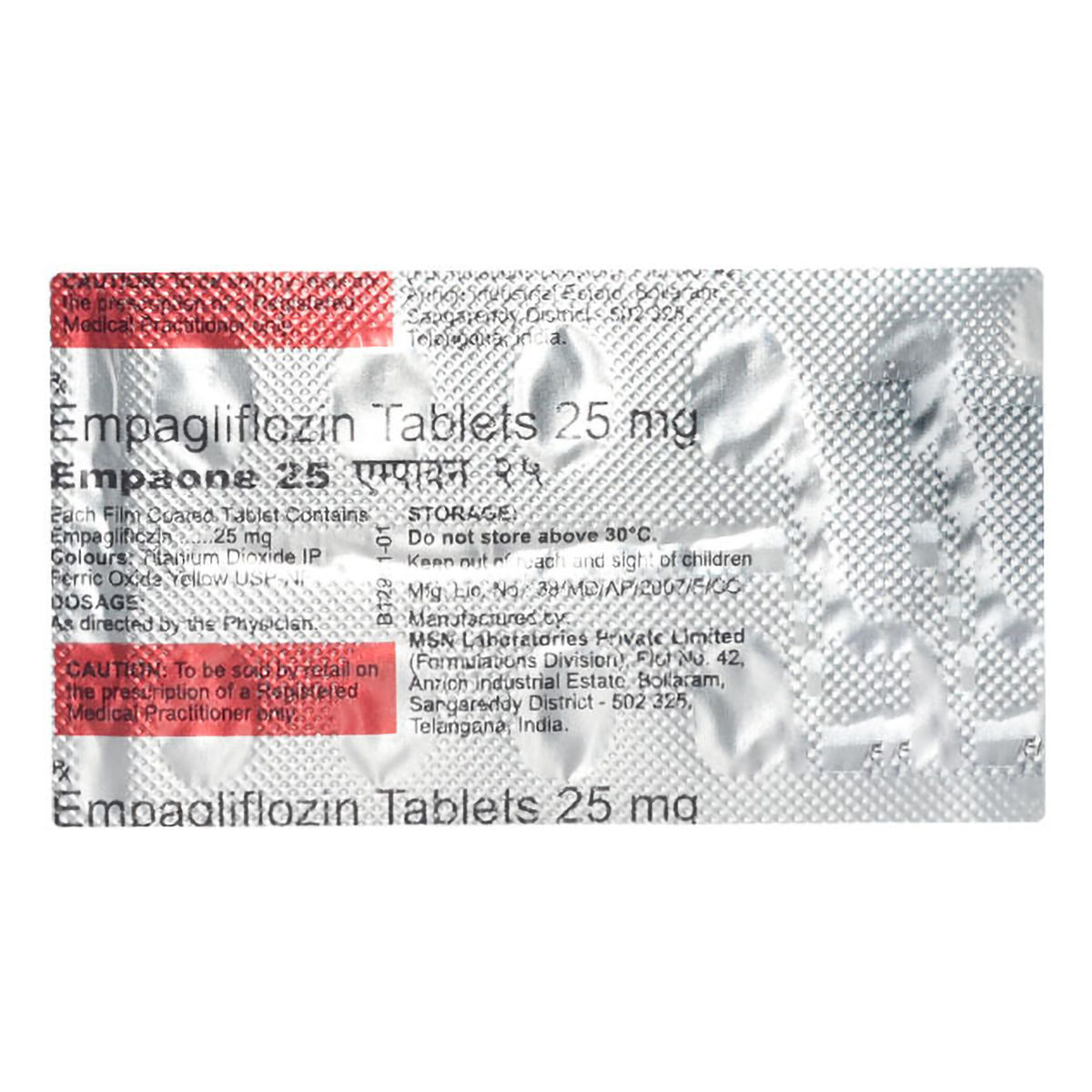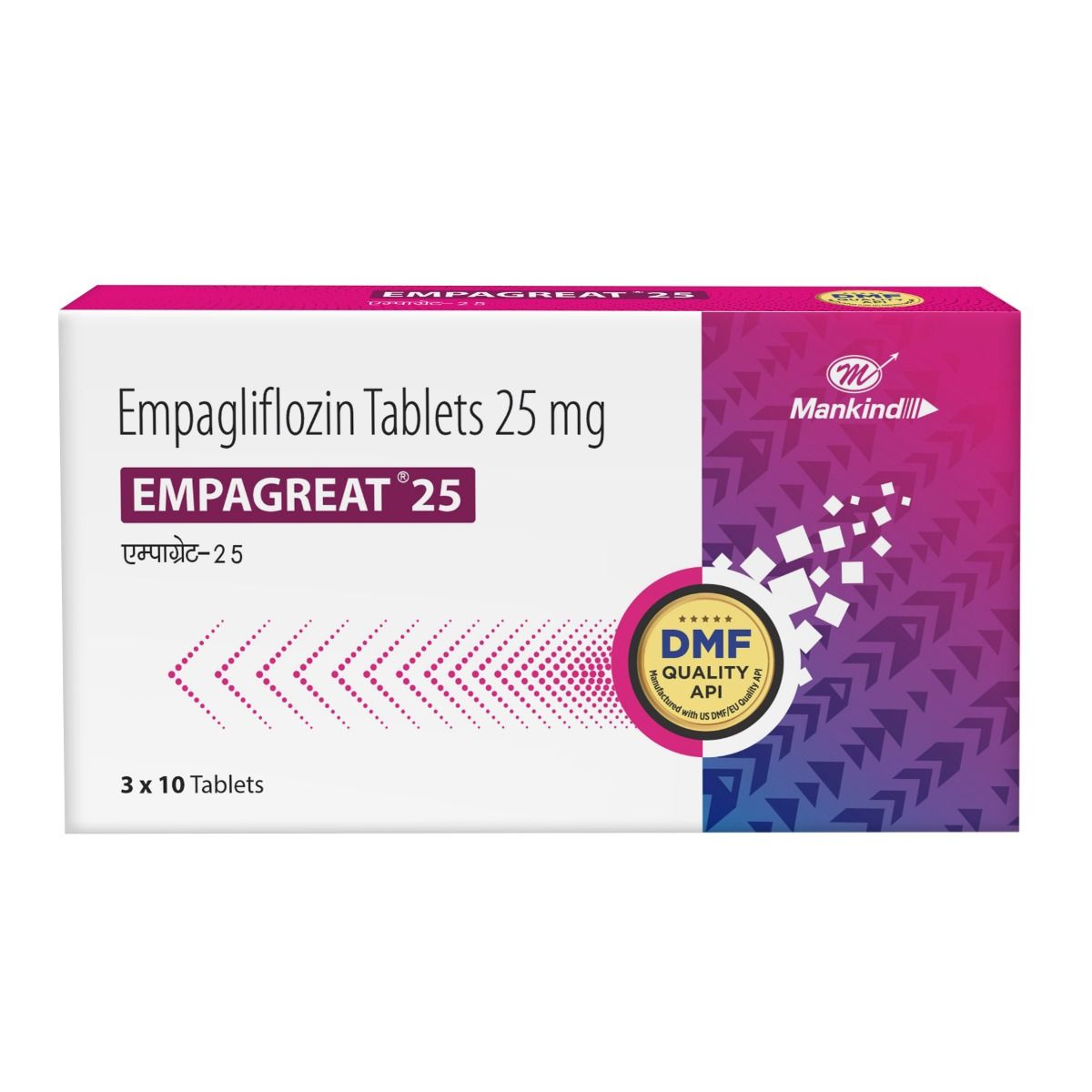Glifaz 25mg Tablet

₹540*
MRP ₹600
10% off
₹510*
MRP ₹600
15% CB
₹90 cashback(15%)
Free Delivery
With Circle membership
(Inclusive of all Taxes)
This offer price is valid on orders above ₹800. Apply coupon PHARMA10/PHARMA18 (excluding restricted items)
Know Your Delivery Time
Provide Delivery Location
Available Offers
 Prescription drug
Prescription drugWhats That

Secure Payment

India's Most Trusted Pharmacy

Genuine Products
About Glifaz 25mg Tablet
Glifaz 25mg Tablet is used in the treatment of type 2 diabetes when diet and exercise alone cannot control their blood sugar levels. Type 2 diabetes is a condition where the body does not make enough insulin, or the insulin that it makes does not work properly.
Glifaz 25mg Tablet contains empagliflozin, which works by blocking the sodium-glucose co-transporter-2 (SGLT-2) enzyme in the kidney's proximal tubules. It lowers renal reabsorption of glucose and increases urine excretion of glucose via inhibiting SGLT2. As a result, it lowers blood sugar levels in diabetics.
Take Glifaz 25mg Tablet as prescribed. You are advised to take Glifaz 25mg Tablet for as long as your doctor has prescribed it for you, depending on your medical condition. In some cases, you may experience certain common side effects such as thrush, pain or a burning feeling when you pee, peeing more than normal, and mild skin rash or itchy skin. Most of these side effects do not require medical attention and will resolve gradually over time. However, you are advised to consult your doctor if you experience these side effects persistently.
Do not consume Glifaz 25mg Tablet if you are allergic to any component present in Glifaz 25mg Tablet. If you are pregnant or breastfeeding, consult your doctor before taking Glifaz 25mg Tablet. Avoid drinking alcohol while taking Glifaz 25mg Tablet since it may produce unpleasant side effects. There is limited information available about the use of Glifaz 25mg Tablet in children. Therefore, it is not recommended for use in children. Inform your doctor about all of the medications you are taking, as well as your medical history, to rule out any undesirable side effects or interactions.
Uses of Glifaz 25mg Tablet
Directions for Use
Medicinal Benefits
Glifaz 25mg Tablet plays a vital role in managing diabetes and achieving good control of blood sugar levels by delaying the absorption of sugar and increasing insulin sensitivity in the body. Glifaz 25mg Tablet does not cause a sudden lowering of the blood glucose level or cause significant hypoglycaemia. In the prediabetic condition, Glifaz 25mg Tablet is the only recommended treatment available. Glifaz 25mg Tablet also helps to prevent serious complications of diabetes such as kidney damage (Diabetic Nephropathy), blindness (Diabetic Retinopathy), loss of sensation in your hands and feet (Diabetic Neuropathy) or even loss of foot! Glifaz 25mg Tablet also helps to reduce your chance of having a heart attack or stroke.
How Glifaz 25mg Tablet Works
Storage
Side Effects of Glifaz 25mg Tablet
Thrush (fungal infection)
Pain or a burning feeling when you pee
Peeing more than normal
Mild skin rash or itchy skin
What if I have taken an overdose of Glifaz 25mg Tablet
Drug Warnings
If you are allergic to any of the ingredients in Glifaz 25mg Tablet, do not consume it. If you suffer heart abnormalities, diabetic ketoacidosis, skin problems, acute pancreatitis, low blood sugar levels, or kidney or liver problems, notify your doctor. If you are pregnant or breastfeeding, consult your doctor before taking Glifaz 25mg Tablet. Avoid drinking alcohol while taking Glifaz 25mg Tablet since it may produce unpleasant side effects. Inform your doctor about all the medications you are taking and your medical history to rule out any unwanted side effects.
Diet & Lifestyle Advise
Include foods rich in healthy carbohydrates and fibre, fruits, whole grains, and vegetables in your diet.
Try eating food at regular intervals. Do not skip meals. Also, try not to overeat.
Follow a healthy diet and walk for at least 45minutes to complement treatment with Glifaz 25mg Tablet.
Maintain a healthy weight by exercising regularly.
Rest properly, and avoid stress by doing meditation or yoga.
Habit Forming
Therapeutic Class
Glifaz 25mg Tablet Substitute

Jardiance 25 mg Tablet 10's
by Others
₹63.99per tabletGibtulio 25 mg Tablet 10's
by AYUR
₹15.30per tabletCospiaq 25 mg Tablet 10's
by Others
₹15.00per tabletEmpaone 25 Tablet 10's
by Others
₹14.85per tabletVicra 25 Tablet 10's
by Others
₹16.20per tablet
Product Substitutes
Alcohol
Unsafe
It is advisable not to consume alcohol along with Glifaz 25mg Tablet to avoid unpleasant side effects like lactic acidosis.
Pregnancy
Caution
Glifaz 25mg Tablet is not recommended during pregnancy. However, your doctor may prescribe it for you during pregnancy if he/she feels the benefit outweighs the risk. You should not take Glifaz 25mg Tablet without a doctor's advice.
Breast Feeding
Unsafe
Glifaz 25mg Tablet is not recommended if you are breastfeeding or if you are planning to breastfeed your baby.
Driving
Safe if prescribed
Glifaz 25mg Tablet should not affect your ability to drive or operate machinery/tools.
Liver
Caution
Glifaz 25mg Tablet to be taken with caution, especially if you have a history of liver diseases/conditions. The dose may have to be adjusted by your doctor.
Kidney
Caution
Glifaz 25mg Tablet to be taken with caution, especially if you have a history of Kidney diseases/conditions. The dose may have to be adjusted by your doctor depending on your renal functions. Glifaz 25mg Tablet is not recommended in severe kidney disease. Regular monitoring of kidney function tests is therefore important if you're taking Glifaz 25mg Tablet.
Children
Safe if prescribed
Glifaz 25mg Tablet is not recommended for children below ten years of age. The dose is to be adjusted and recommended by a child specialist only for children over ten years.
FAQs
Disclaimer
Author Details
We provide you with authentic, trustworthy and relevant information


















